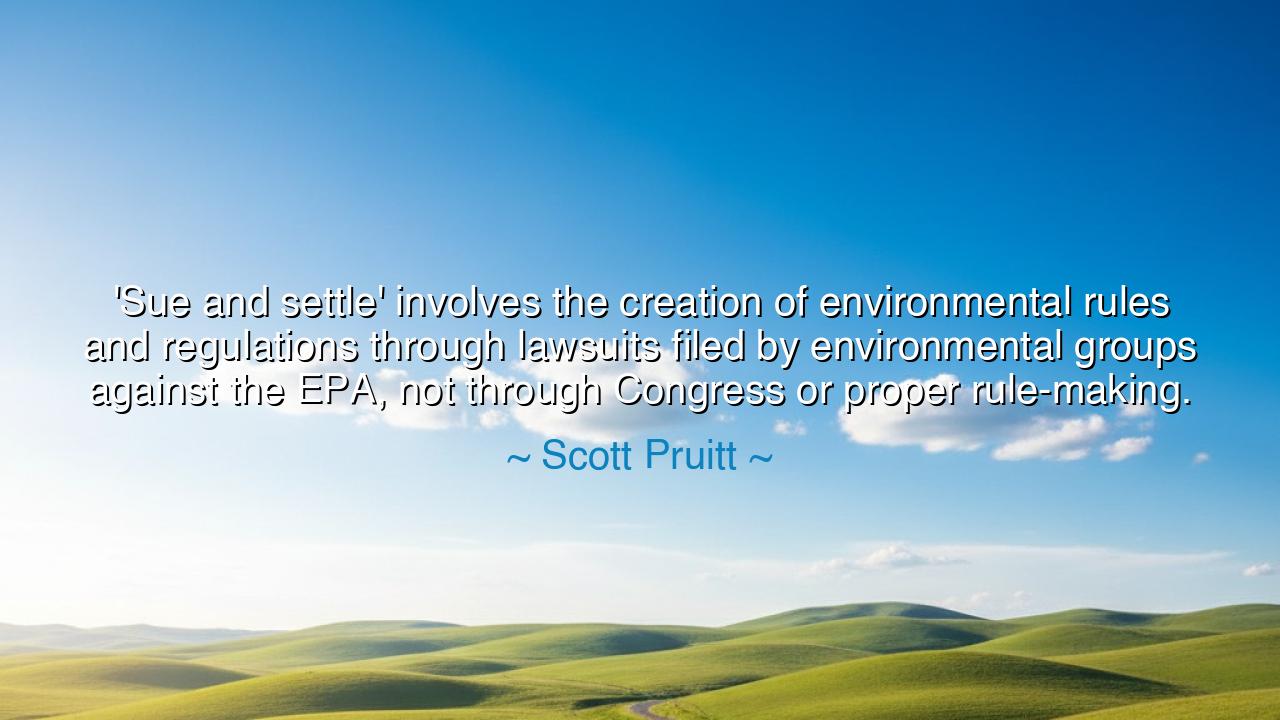
'Sue and settle' involves the creation of environmental rules and
'Sue and settle' involves the creation of environmental rules and regulations through lawsuits filed by environmental groups against the EPA, not through Congress or proper rule-making.






Hear the words of Scott Pruitt, spoken with the gravity of a man who saw conflict not only in politics but in process: “‘Sue and settle’ involves the creation of environmental rules and regulations through lawsuits filed by environmental groups against the EPA, not through Congress or proper rule-making.” These words strike at the heart of governance, revealing the tension between law born of open debate and law born of courtroom negotiation. It is the lament of one who feared that the proper channels of authority—crafted by the people’s representatives—were being bypassed in favor of a quieter, swifter, and less accountable path.
The meaning of this quote lies in the practice called “sue and settle.” Environmental organizations, frustrated by delays or inaction from the Environmental Protection Agency, would file lawsuits demanding that the agency fulfill certain obligations under existing law. Rather than fight the case through long trials, the EPA at times would choose to settle, agreeing to issue new rules or enforce new standards. To Pruitt, this was not merely a legal shortcut but a distortion of democracy itself. For rules that shape industries, jobs, and the environment were being forged in the chambers of lawyers, not in the halls of Congress, where debate and representation are meant to reign.
The origin of these words comes from the long struggle over environmental regulation in the United States. Since the rise of the EPA in 1970, the agency has been charged with balancing the health of the land and air against the forces of industry and growth. But where Congress often hesitated, divided by politics, environmental groups turned to the courts, wielding lawsuits as weapons to compel action. The practice of “sue and settle” was praised by some as an efficient way to enforce environmental law, but condemned by others, like Pruitt, as a secretive alliance between advocates and bureaucrats.
History itself offers us a mirror. Consider the age of monarchs, when kings would issue edicts not through councils or parliaments but through whispers with favored advisers behind palace walls. Laws crafted in secrecy often stirred resentment, for they lacked the voice of the governed. In contrast, when the Roman Republic was at its strength, laws were debated in the forum, argued before senators, and voted upon by citizens. Though slower and messier, this process gave legitimacy, for the people could see themselves reflected in the law. Pruitt’s warning echoes this same truth: that laws must not only be just, but must be born in the open.
The lesson is profound: process matters. It is not enough for rules to exist; they must be crafted in ways that respect transparency and representation. If the law is born in backrooms, no matter how noble the cause, it risks losing the trust of the people. And without trust, even good laws crumble, for they are seen not as shields of justice but as chains imposed without consent. Thus, Pruitt calls for vigilance—that in protecting the earth, we must also protect the integrity of democracy.
What then must we do? As citizens, we must demand that laws, whether for the environment or for any cause, pass through the light of open debate. Support those who labor to make the process transparent, where the voices of many, not just the few, are heard. At the same time, hold Congress accountable when it delays or ignores the pressing needs of the people, for when representatives fail to act, they create the vacuum that gives rise to practices like sue and settle. Balance must be sought: swift action for the environment, yet action rooted in legitimacy.
Thus, remember Scott Pruitt’s words: “‘Sue and settle’ involves the creation of rules not through Congress or proper rule-making.” Whether you agree with his judgment or not, the teaching endures—law must be made openly, lest the people lose faith in its justice. Pass this wisdom down: that democracy is not only about outcomes, but about the path by which those outcomes are reached. For in the integrity of the process lies the strength of the law, and in the strength of the law lies the endurance of the republic.






AAdministratorAdministrator
Welcome, honored guests. Please leave a comment, we will respond soon